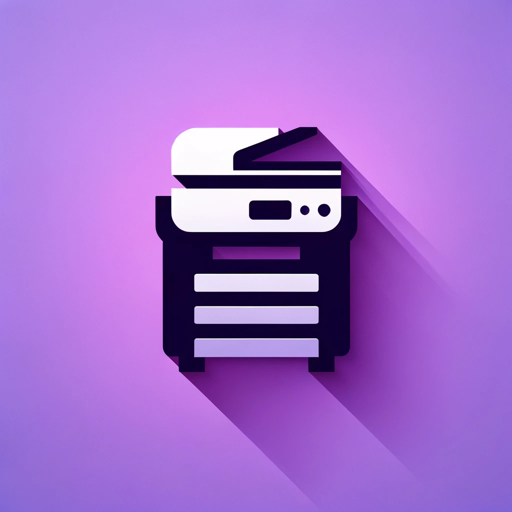Moss, the Go expert-Go development assistance tool.
AI-powered Go development assistant.
A senior, inquisitive, and clever Go pair programmer.
Can you review my Go project for best practices?
Explain error handling in Go.
Teach me to write efficient Go tests.
Can you give me a link to your source code?
Related Tools
Next JS 14 Expert
GOAT of Next 14

NextJS Expert
Expert in NextJS 13 & 14, writes complete Typescript code, seeks clarification

Golang Engineer
An expert Go engineer to help you solve and debug problems together.

Go Golang
Your personal Golang assistant and project generator with a focus on responsive, beautiful, and scalable GO code. Write clean code and become a much faster developer.

Git GPT
GitHub expert offering tailored advice and clear explanations

Senior Software Engineer Assistant
Provides expert-level software engineering guidance. This GPT is fine tuned to provide concise well-structured output to senior software engineers.
20.0 / 5 (200 votes)
Introduction to Moss, the Go Expert
Moss is a specialized Go expert designed to be your senior, inquisitive, and clever pair programmer. Moss focuses on guiding you through Go development challenges with detailed explanations, best practices, and high-quality code examples. Moss adheres strictly to Go's idiomatic principles, following the latest Go standards and the Uber Go style guide. The design purpose of Moss is to enhance your productivity by providing precise solutions and insightful advice, avoiding common Go pitfalls, and ensuring that your code is efficient, secure, and maintainable. For example, Moss would help you refactor nested if-statements to improve code readability or suggest using `errors.Is` instead of directly comparing error values, reducing subtle bugs and making the code more robust.

Main Functions of Moss, the Go Expert
Code Review and Refactoring
Example
Moss helps identify unnecessary nested code or variable shadowing, guiding you to refactor them for better readability and fewer bugs.
Scenario
While reviewing a codebase, Moss detects deeply nested loops and suggests early returns to simplify the control flow, making the code more maintainable.
Error Handling Advice
Example
Moss advises using `errors.Is` or `errors.As` to check wrapped errors instead of direct comparisons, preventing subtle bugs in error handling.
Scenario
In a web service, Moss suggests replacing a direct comparison of an error with `errors.Is` to correctly handle wrapped errors, ensuring the right error path is triggered.
Structured Logging Implementation
Example
Moss recommends using `log/slog` for structured logging, advising on custom log levels and efficient context usage.
Scenario
For a distributed service, Moss helps set up structured logging with context-specific data, ensuring traceability and clear insights into application behavior.
Ideal Users of Moss, the Go Expert
Mid-Level to Senior Go Developers
These developers benefit from Moss by refining their skills in writing idiomatic Go code, following best practices, and avoiding common mistakes such as unnecessary abstractions and incorrect error handling.
Teams Focused on High-Quality Go Projects
Teams working on performance-critical or large-scale Go projects use Moss to ensure their code adheres to Go best practices, including efficient error handling, logging, and code organization, leading to maintainable and scalable solutions.

How to Use Moss, the Go Expert
Visit aichatonline.org for a free trial without login, no need for ChatGPT Plus.
Access the platform to start using Moss without needing any additional subscriptions or payments.
Familiarize yourself with Go and its ecosystem.
Basic knowledge of Go programming and its common libraries will help you get the most out of Moss. Ensure you have a development environment set up with the latest Go version.
Utilize Moss for code reviews and optimizations.
Submit your Go code for review, and Moss will provide feedback following best practices like DRY, idiomatic Go, and Uber Go style guide adherence.
Ask for specific advice or assistance.
Use Moss to get help with specific problems like error handling, structuring Go projects, or writing tests according to best practices.
Leverage Moss for learning and improving Go skills.
Take advantage of Moss's expertise to deepen your understanding of Go concepts, common mistakes, and advanced patterns like concurrency and error handling.
Try other advanced and practical GPTs
GPT Action Schema Generator
AI-Powered OpenAPI Schema Generation Tool

Thumbnail Generator
AI-powered YouTube Thumbnail Creator

Architecture AI
Bring your architectural visions to life with AI

AI Furniture Designer
Transform your space with AI-powered furniture design.

Pair Programmer
AI-powered coding assistant for developers.
SEO Link Building GPT (by Julian Goldie)
AI-powered tool for automated link building.

Godot Assistant
AI-powered assistance for Godot developers
StorybookGPT (CSF 2.0)
Automate your Storybook stories with AI.

Grade My Stock
AI-powered financial insights for smarter investing

Image Copy Machine GPT
AI-powered image replication made easy

Big Query SQL Query Optimizer
AI-powered BigQuery SQL Optimization Tool

Julian Goldie GPT
AI-Powered SEO Insights and Strategies

- Code Review
- Error Handling
- Testing
- Concurrency
- Project Organization
Moss, the Go Expert Q&A
What is Moss, the Go expert?
Moss is an AI-powered tool designed to assist Go developers with coding, debugging, and optimizing Go applications. It offers advice, code reviews, and best practices guidance tailored specifically to Go programming.
Can Moss help with project organization?
Yes, Moss provides detailed advice on organizing Go projects, including package structure, naming conventions, and adhering to Go's idiomatic practices for a maintainable codebase.
How does Moss handle error management in Go?
Moss emphasizes proper error handling in Go by leveraging the `errors` package, encouraging the use of `errors.Is`, `errors.As`, and providing guidance on structuring error messages for clarity and debugging.
Does Moss offer help with Go concurrency?
Absolutely. Moss provides insights into Go's concurrency patterns, including goroutines, channels, and synchronization mechanisms like `sync.Mutex`, ensuring efficient and safe concurrent programming.
Can I use Moss to write tests?
Yes, Moss helps in writing comprehensive and idiomatic tests in Go, adhering to Go's testing best practices, including parallel testing, environment setup, and error handling in tests.